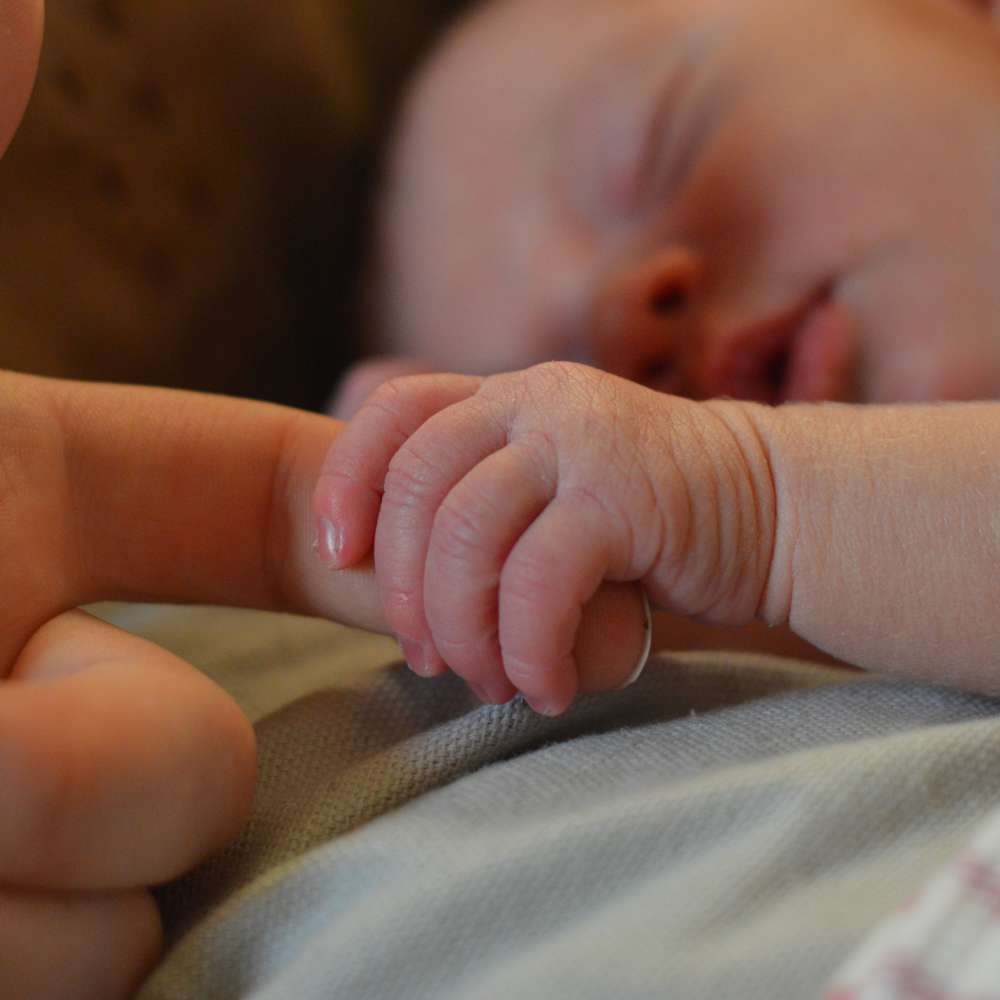Can you sleep train newborns?: Sleep tips for newborns

Welcome to the “fourth trimester”! The "fourth trimester" is a term typically used to describe the first three months, or 12 weeks, of your baby’s life in the outside world. This is the “newborn” phase, which can be the most beautiful, magical, emotional, exhausting, and confusing time. It’s normal to feel overjoyed one minute, then completely overwhelmed the next.
Your experience of the newborn phase can be very different from someone else’s. Some babies may adjust to feeding and sleeping quite easily, while others will need more time and extra support. Hang in there and just know you are not alone. We are here to help guide you.
IN THIS ARTICLE:
Can you sleep train a newborn?
Can a newborn be on a schedule?
Can newborn twins and multiples be on a schedule?
What to do if your newborn is struggling with sleep
Takeaway: Sleep training newborns
Can you sleep train a newborn?
Sleep training is not recommended just yet. The aim of many traditional sleep training methods is to establish independent self-settling skills so your baby can connect sleep cycles and sleep for longer periods of time. Newborns do not have the ability to self-soothe and will need external help to fall asleep, and stay asleep, a lot of the time.
Your baby has a very different sleep pattern compared to older infants and yourself. Newborns have underdeveloped circadian rhythms, which means they don't yet have a well-established day-night sleep cycle. This is why they often sleep in short bursts throughout the day and night or may even have their days and nights reversed.
In saying that, now is the time to start to build the right sleep foundations. Instead of sleep training, our focus will be on helping you create a safe and comfortable sleep environment for your newborn to optimize sleep.
As your baby gets older and their sleep patterns start to mature, you can begin to implement gentle and gradual sleep training methods to encourage longer stretches of sleep. This is typically from 3 - 6 months of age.
Always consult with your pediatrician before implementing any sleep-related strategies with your newborn.
4 sleep tips for newborns
Tip #1: Establishing proficient feeding is just as important as sleep.
Whether or not your little one is exclusively breastfed, is taking formula from a bottle, or is mixed-fed, a well-fed baby is a happy baby. Feeding, regardless of the type of nourishment, doesn’t always come naturally so seeking advice early on can be so beneficial.
Pediatricians, health nurses, doulas, and lactation consultants are valuable resources who will monitor and observe feeding times and can evaluate your baby for any issues such as gas, reflux, tongue-tip ties, allergies, etc.
Tip #2: Swaddle your newborn for sleep times and offer skin-to-skin contact during the day.
Your newborn needs to feel safe and secure and this can be achieved through swaddling and skin-to-skin contact (also known as “kangaroo care”). During times when your baby is most unsettled, provide as much comfort and physical contact as you can.
Tip #3: Start to establish sleep routines.
Routines and schedules are different. A routine is something you do in the same order repetitively. A schedule is something you do at the same time.
You can begin to implement a pre-bed and pre-nap sleep routine right from the start. It is never too early.
You can also start to follow an eat-play-sleep routine to help guide your day and get your family into a rhythm which can be helpful when you are sleep-deprived yourself.
Tip #4: Look for opportunities to fall asleep unassisted.
We know that newborns cannot establish independent sleep habits just yet, however, you can practice by placing your baby into their sleep space from a slightly awake state every so often.
As your baby gets closer to the 3-month mark, you may be able to start implementing the “pick-up/put-down method” which is a great place to begin your sleep training journey.
The pick-up/put-down method works by placing your baby into the crib while drowsy but still awake. If they start to fuss, wait a small amount of time, then pick them up to console them. After a few minutes, place your baby back into their crib. Repeat this process until they are asleep. Gradually over time you would increase the pause time and reduce the pick-up console time.
Can a newborn be on a schedule?
Sorry to say, but no. Newborn babies are born with a disorganized circadian rhythm which means implementing a “by the clock” schedule is unachievable. Around 3 - 4 months of age, your baby’s sleep will begin to mature making sleep and wake cycles a little more predictable.
For now, we want to watch for sleepy cues and awake windows to help navigate sleep times. In the first month, your baby may be awake for between 30 - 90 minutes over 4 - 6 naps. For a 2 month sleep schedule and 3 month sleep schedule, we would see awake windows lasting 45 - 90 minutes over 4 - 5 naps.
It is totally normal for newborns to start their nighttime sleep from 9:00 PM onwards. We would also expect them to wake multiple times in the night to feed. It’s also common for your baby to take a 30 - 120 minute nap. Exhausting, right?
Some newborn babies will be more awake during the night than during the day. This is called reverse cycling or day/night confusion. Usually time and patience resolve this but you can also try to cap long naps at the 2-hour mark to speed things along.
Can newborn twins and multiples be on a schedule?
As we mentioned earlier, newborns cannot be placed on a “by the clock” schedule just yet, however, if both twin siblings (or multiples) have very different sleep patterns, you may find yourself up all day and all night which isn’t sustainable long-term.
Many twin/multiple families will help synchronize the schedule by feeding the awake twin first, then rousing the other twin immediately after for night feeds. During the day, if one twin wakes from a nap first, wake the other within 30 minutes.
Some parents do not mind their twins or multiples being on their own individual schedule and that is totally fine too.
What to do if your newborn is struggling with sleep
This is such a learning explosion for all the family so reaching out for further guidance and support can be so beneficial.
Here are a few things to consider if your baby is struggling to sleep.
Keep an eye on your baby’s sleep cues and awake windows.
Check your baby’s diaper and when they were last fed. If gassy, your baby may need extra burping.
Continue to consult with your medical team to determine if there are any underlying medical reasons causing sleep difficulties or discomfort.
Reach out to us for a customized sleep plan through Huckleberry Premium for additional guidance and support.
Takeaway: Sleep training newborns
The fourth trimester, or newborn phase, is a time of adjustment for all the family. Learning all about your new baby and creating your special bond starts from the moment your little one enters the world. This is such a precious time that goes by so quickly. Adapting to parenthood is a process and this is your journey. Enjoy those newborn kisses and cuddles and know help is on hand when you need it.
Newborn sleep FAQ
Q: My baby is really fussy in the afternoon/evening. Why is that?
A:
It’s common for babies to cry and resist sleep in the afternoon/evening. This is often referred to as the “witching hour”. Keep an eye on your baby’s feeding schedule, wake windows, and sleep cues to help reduce overtiredness and hunger. An overtired or hungry baby often struggles to be consoled.
Q: How do I get my newborn to sleep for longer stretches at night?
A:
Some families find that offering a dream feed, which is a nursing session or bottle that is offered to your baby a few hours after bedtime (and right before your bedtime) can help sync a longer stretch of sleep for both baby and parents. Cluster feeding (when you offer a few more feeds closer together in the evening before bedtime) in the early evening may also help to promote longer stretches of sleep.
Q: Should newborns fall asleep on their own?
A:
As long as you have followed the American Academy of Pediatrics’ safe-sleeping guidelines [1], it is absolutely fine to let your newborn baby fall asleep without you there. However, if they are struggling to fall asleep, it is best to offer them comfort and reassurance. We don’t recommend any form of “cry-it-out” as newborns often need help to fall asleep.
Q: Which sleep training method is safe and best for newborns?
A:
Any sort of official sleep training isn’t recommended for babies between 0 - 3 months (0 - 12 weeks) of age, as they are unable to self-soothe. As your baby approaches 3 months (12 weeks) of age, you may be able to start some gentle sleep training such as: “pick-up/put-down”, gradual method, or the chair approach.
Q: Is it harder to sleep train newborns?
A:
Yes. We don’t recommend starting formal sleep training before 3 months (12 weeks) of age due to your baby's disorganized sleep pattern and also because they do not have the ability to self-soothe. In the meantime, we recommend focusing on wake windows and feeding on demand as well as starting to build some positive sleep foundations.
Q: Can you let newborns cry it out?
A:
Newborns need to be close to their primary caregivers in order to feel safe, comforted and for their needs to be met. Babies cry as a form of communication, and within the first 3 months (12 weeks), learning about your baby’s cries can help you to decipher some of those cues. Many babies cry due to hunger, tiredness, pain, discomfort, surprise, dirty diaper, etc. So, always listen and respond to your baby’s needs. In terms of sleep training, we do not recommend “cry-it-out" for newborn babies.
If you're curious about what lies ahead with sleep training, glimpse into the future to see what you might experience once your baby is an infant.
Note: The content on this site is for informational purposes only and should not replace medical advice from your doctor, pediatrician, or medical professional. If you have questions or concerns, you should contact a medical professional.
1 Sources
THE TASK FORCE ON SUDDEN INFANT DEATH SYNDROME AND THE COMMITTEE ON FETUS AND NEWBORN; Sleep-Related Infant Deaths: Updated 2022 Recommendations for Reducing Infant Deaths in the Sleep Environment. Pediatrics. https://publications.aap.org/pediatrics/article/150/1/e2022057990/188304/Sleep-Related-Infant-Deaths-Updated-2022?autologincheck=redirected



